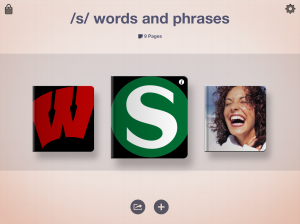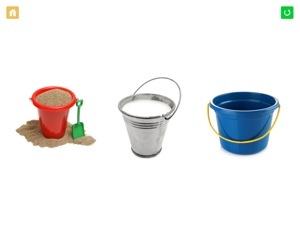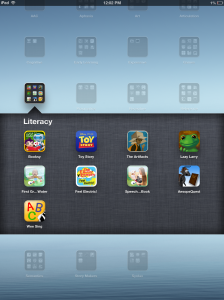MY WEBSITE HAS MOVED! In order to continue seeing updates on this post, PLEASE bookmark the link below or click here to see the updated version!
http://speechymusings.com/2013/01/05/must-have-free-apps-for-every-slp-or-slp-graduate-student/
If you want to update your pin on Pinterest with the updated website, please click here and repin my new pin!! THANK YOU!

So you got an iPad over the holidays? It’s all very exciting because you’ve heard so many great things about using it in therapy, right? But now what?!
This is exactly how I felt when I got my iPad. I’m a poor graduate student who honestly can’t afford very many popular but expensive applications. So, I set out on a mission to find adaptable, useful and FREE applications for my iPad.
If you are in the same boat, or simply looking to add to your collection of apps without spending money, read on 🙂
1) StoryCreator: I already did an entire blog post devoted to this app. You can read my post on StoryCreator here.

2) All of the Lingraphica applications.

How I Use Them:
These apps are great for adults with aphasia and/or apraxia. Most of them upen up to a screen similar to the screenshot shown above. Then when you press one of them, for example, /fr/, a video pops up of a person’s mouth saying fffrrr. It helps give focused stimulation both visually and auditorily! One of my clients practiced using this app as a cuing strategy for himself when he forgot things such a numbers, days of the week, or months of the year (there are apps for all of those!). This was great for him because it made him feel more independent and decrease his reliance on my cues! He could use this strategy out in the community independently! If you are working with people with aphasia, search for Lingraphica in the App Store!
3) Hungry, Hungry Hippos: A classic game that is just as addicting in iPad form!

How I Use It:
-This game can primarily be used as a reinforcer. It is very easy to operate and learn, even for those kiddos with poor fine motor control. Each game is also really fast so you won’t find yourself trying to pry the iPad away mid-game!
4) Talking Pierre, Talking Tom 2, and Talking Ginger: These apps are FANTASTIC for getting quiet kids to talk and have fun doing so! Thus far, my kiddos have enjoyed Talking Ginger the most!

How I Use It:
You can also practice basic pragmatics by giving the child a scenarios (ex: “asking another child to play”) and prompting them to practice with the animal in the app. Then, they can reflect on how the question sounds when it’s repeated back to them!
5) Image Search: Essential if you have apps that allow you to upload personal photos! (e.g.: StoryCreator)

This app allows you to do a Google Image Search and download the pictures directly onto your iPad! I use it to fill my books on Story Creator with pictures. You can also look up silly pictures for children to describe, etc… Definitely an essential, free app!
6) Book Apps: There are too many to list all of them, but if you want/need more book apps there are many good, free options. I have Toy Story, Lazy Larry, and The Artifacts. I would recommend all of them for working on topics such as story retell and comprehension.

7) Sort It Out: This is a good app for sorting into categories!

How I Use It:
I’ve used this app with the kiddos who are fairly good at basic, salient categories but need more work with subcategory work! For example, it would be at a good level for a child who could identify a ‘toy’ from an ‘animal’ but who has trouble identifying different toys such as a ‘ball’ vs a ‘vehicle’ vs a ‘stuffed animal’.
8) What If? – A great app with conversation starter questions.

How I Use It:
This conversation starter app can target carryover of articulation targets to the conversational level, asking and answering questions, stating opinions and giving reasons to support their opinion, topic maintenance, and grammar skills within conversation! It really helps when you’re low on question ideas!
9) Little Finder: An app that works on receptive language (at the word level) and vocabulary development.

How I Use It:
Once opened, the app lets you choose between 1 player or 2 players. Then, the game begins. It says a word out loud (and also shows the written form at the bottom of the screen). The child is timed to see how fast they can find the picture that matches each corresponding word. I love this game because its a more motivational way to teach basic vocabulary, listening skills, or to test receptive language at the word level!
10) WH Questions: A great app created by Super Duper that targets WH Questions. The free version only includes ‘who’ but it’s been really useful!

How I Use It:
Obviously for answering wh- questions! 🙂 This app is also awesome because the foil answers are tricky! They tend to be answers for other wh- question forms (see picture above). This forces the student into really understanding what ‘how’ means vs ‘when’ etc…
11) Mad Libs: Just like the old school paper version, but in iPad form!

How I Use It:
I’ve used this app as a fun break for many kids with language goals. It helps solidify the parts of speech (e.g.: nouns, verbs, adjectives, etc…) while being motivating and fun! There are 21 stories included in the free version, which should be enough to use in a clinical setting!
12) SeeTouchLearn: A must have application for anybody working on receptive language or vocabulary development!

How I Use It:
This app is amazing! It allows you to create ‘quizzes’ testing vocabulary and receptive language (see picture below).

It comes with a good library (as seen in the first photo). You can use the included templates or customize your own. You can choose the carrier phrase and even record your own voice for each page! After each quiz is completed, data is shown.

Download it and play around!
13) Comparative Adjectives


This application tests exactly what you’d guess: comparative adjectives! Each page verbally prompts the child to select one of the items on the page. Some are easier (see the first picture which stated, “find the smallest item”) while some are more difficult (see the second which stated, “find the lightest bucket”).
14) Name Things: This app targets naming items within a particular category.

One great feature about this app is that you are given the opportunity to select only the categories you want to test.

How I Use It:
I use this app for a wide variety of kids! I’ve used it for kids with some level of word finding troubles as well as children working on categories! I’m sure there are many other ways to use this!
Organizing all of those apps is also important! I organize my applications into topic folders. Click on the picture below to enlarge if it’s difficult to read!

Then when I open up a folder, for example, literacy, I see all of the applications/books I use for those kiddos. (PS: All of the apps you see below are FREE as well!)

Also: I know I said free apps in the title, but I thought I’d share the only two apps I’ve paid for as well because I LOVE both of them! I waited until each was 50% off and purchased! 🙂
First, I own Articulation Scenes which I would definitely recommend. All of the kids I’ve played it with have really enjoyed it. I mostly use it as a reward even though it’s articulation practice as well! That’s how much fun it can be! 🙂 The second app I’ve purchased is Choiceworks which I would also recommend if you are in the market for a schedule/timer app. It’s very comprehensive and works well for kiddos that need a little extra structure!
So there you have it! Have fun downloading and playing! Are there any amazing free apps I left out? I’d love to hear from YOU!
Thanks for reading! If you are interested in staying up to date on freebies, giveaways, and new posts, ‘like’ me on Facebook here.
**Update: Due to a great idea from a reader comment, I took screenshots in each folder on my iPad. You can see that post here. From there you should be able to see all of my apps and my organizational system!
**Ultra Edit: I’ll keep a list below of FREE apps I continue to find and love!
–Toca Kitchen Monsters and Toca Tailor Fairy Tales: Great for following directions and general reinforcements. Kids love these apps!
–Where Do I Go? – Good app for sorting at categorization. Students sort items into the correct room of the house.
–Build A Word Express – Great for phonological awareness and putting sounds together to make words!
–Endless Alphabet – Love this app! Thanks to Rachel for commenting and pointing it out to me 🙂 It has really cute graphics also!

































